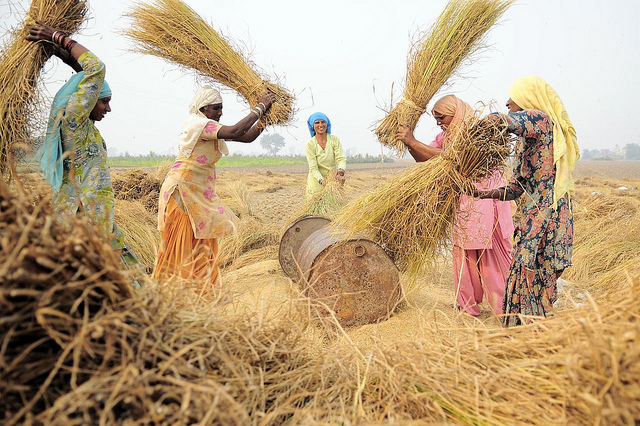Lauren Wessel, Marissa Van Epp and Dhanush Dinesh (CCAFS)
This blog was first published on 18 October on the CCAFS website

Green GB Week (15-19 October 2018), a new initiative in the UK this year, came just in time. If it was not clear before, the recent IPCC Special Report on Global Warming of 1.5°C is unequivocal that limiting further temperature rise to 1.5°C requires decisive action to reduce emissions in all sectors, now.
While Green GB Week focused on domestic clean growth, it’s a fitting moment to think about UK support for climate change mitigation and adaptation abroad, too. On 16 October, the official World Food Day, Harriett Baldwin MP, Minister of State for Africa at the Foreign & Commonwealth Office and Minister of State for International Development, wrote about UK Aid's efforts to invest in research and development to enhance resilience of food systems in Africa to the impacts of climate change.
The agricultural sector, one of the sectors most vulnerable to the negative impacts of climate change while at the same time responsible for 11% of global emissions, requires nothing short of a transformation in the face of a changing climate. At this intersection of multiple challenges under climate change, climate-smart agriculture (CSA) has emerged as a promising approach to drive transformational change in agricultural systems. The need for more farmers to adopt climate-smart agriculture is pressing. Yet the highly diverse and context-specific nature of different agricultural systems makes scaling CSA challenging.
To understand the opportunities and challenges for scaling up CSA, and to provide a central mechanism for policy cohesion at different geopolitical levels, the CGIAR Research Program on Climate Change, Agriculture and Food Security (CCAFS) is launching a Learning Platform on Partnerships and Capacity for Scaling CSA.
The platform will be hosted by the Priestley International Centre for Climate at the University of Leeds, and is supported by UK Aid, one of CCAFS’ major funders. On November 26th, CCAFS and the University of Leeds will host a seminar and discussion, ‘Scaling up climate-smart agriculture: challenges and opportunities’ to celebrate the launch and kick-start collaboration.
To successfully address the multiple challenges that agriculture faces under climate change, CSA must be scaled up to be adopted by millions of farmers. But agricultural systems are highly diverse. Some farmers rely on agriculture as their main livelihood activity and income source. Others diversify their livelihoods, for instance when agricultural returns are insufficient for survival. Still others are integrated into the bigger capital-intensive global trading systems.
To achieve scale, CSA needs to address this wide range of different motivations and contexts. A study by CCAFS found that some drivers of adoption, such as market access and climate variability, are relevant across countries and regions, whereas others are site-specific, e.g. social constraints that prevent women from selling their products at the market.
Since 2012, CCAFS has had a research focus on ways to scale CSA. Notable contributions include:
•A roadmap for adaptation in agriculture, for the newly launched Global Commission on Adaptation.
•Informing UNFCCC decisions and discussions on agriculture, and supporting negotiators from Africa, Asia and Latin America.
•Trialling and scaling out index based insurance in India, Bangladesh, Honduras, Senegal, Ghana, and Ethiopia, in partnership with industry and government.
•Disseminating low emissions livestock practices to over 600,000 farmers in Kenya.
•Enhancing c. USD 1 billion of investments for climate action in agriculture, including CSA projects in Niger and Kenya by the World Bank ($350 M), and projects in Nicaragua, Comoros, Liberia and Uganda through the International Fund for Agricultural Development’s (IFAD) Adaptation for Smallholder Agriculture Programme.
The University of Leeds has been a partner of CCAFS since the inception of the program, when Professor Andy Challinor of the Priestley International Centre for Climate co-led the CCAFS Flagship Program on Climate-Smart Technologies and Practices.
The Learning Platform on Partnerships and Capacity for Scaling CSA is an opportunity for further collaboration and learning, drawing on the complementary expertise and resources of CCAFS and the University of Leeds.
The November 26th launch event, Scaling Up Climate Smart Agriculture: Challenges and Opportunities, will be held at the School of Earth and Environment at the University of Leeds. The programme will consist of two sessions.
The first session focuses on differentiated adaptation and development pathways for food systems that meet the needs of a diverse array of types of farmers and contexts. The second session will focus on the role of CSA, and the opportunities and challenges for scaling up CSA to realize inclusive and sustainable rural development, drawing on previous experiences from CCAFS. This session will help to identify priorities for the learning platform.
Please note that participation is by invitation only. Interested parties are encouraged to send an email to r.septivita@cgiar.org.
Image: Neil Palmer (CIAT), Flickr